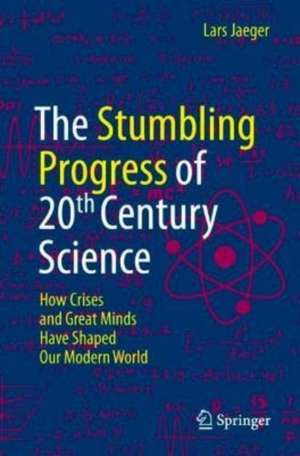The Stumbling Progress of 20th Century Science: How Crises and Great Minds Have Shaped Our Modern World
Autor Lars Jaegeren Limba Engleză Paperback – 25 sep 2022
Preț: 210.69 lei
Nou
Puncte Express: 316
Preț estimativ în valută:
40.33€ • 43.82$ • 33.90£
40.33€ • 43.82$ • 33.90£
Carte disponibilă
Livrare economică 31 martie-14 aprilie
Livrare express 14-20 martie pentru 37.62 lei
Preluare comenzi: 021 569.72.76
Specificații
ISBN-13: 9783031096174
ISBN-10: 3031096177
Pagini: 251
Ilustrații: XIV, 251 p. 7 illus., 3 illus. in color.
Dimensiuni: 155 x 235 x 24 mm
Greutate: 0.38 kg
Ediția:1st ed. 2022
Editura: Springer International Publishing
Colecția Springer
Locul publicării:Cham, Switzerland
ISBN-10: 3031096177
Pagini: 251
Ilustrații: XIV, 251 p. 7 illus., 3 illus. in color.
Dimensiuni: 155 x 235 x 24 mm
Greutate: 0.38 kg
Ediția:1st ed. 2022
Editura: Springer International Publishing
Colecția Springer
Locul publicării:Cham, Switzerland
Cuprins
Newton's World Formula that was not a World Formula - How the Speed of Light Shook up Classical Physics.- The Battle about the Atom: From Boltzmann to Einstein – How Pure Chance Broke into the Well-Ordered World of Physics.- Mathematics Becomes Paradoxical - Georg Cantor and the Insurmountable Contradictions in Infinity.- Darwin's Hesitation and Mendel's Diligence - Life as a Plaything of Molecular Elements.- No more Ground Beneath our Feet - The Collapse of Classical Sciences.
Notă biografică
Dr Lars Jaeger studied physics, mathematics, philosophy and history in Bonn and Paris and spent several years researching theoretical physics in the field of quantum field theories and chaos theory (University of Bonn, Max Planck Institute for Physics of Complex Systems Dresden). He lives near Zurich, where he has built up two companies of his own that use mathematical methods to model global capital markets. However, his enthusiasm for the natural sciences and philosophy has never left him, and he has already written several books on the subject. His most recent is about the revolutions in science in the first half of the 20th century.
Textul de pe ultima copertă
The 70 years from 1880 to 1950 witnessed the final ascent of humankind into the modern age. Historically, this period is characterized by deep political, social and economic crises. However, parallel to this and much less known in the public, rational scientific thinking also experienced the darkest and deepest crisis of its own history. All the great modern scientific discoveries like quantum theory, genetics and neurology are products of this. Ground-breaking discoveries, profound crises, revolutionary thoughts, refutation of previously unshakable beliefs - these years are marked by scientific achievements of numerous great minds, who overturned our understanding of the world, of space, time and infinity, of life, logic and calculability almost overnight. The "intuitive genius" of these pioneers still forms the foundation of today’s scientific thinking and technological progress. In fact, tackling and overcoming those deep scientific crises shaped our modern life like nothing else. The resulting reorientation of our understanding of nature and ourselves allowed ancient philosophical questions to appear in a new light: "What is reality?", "What can we know about the world?" or "What is man's place in nature?". The most exciting period in the history of science is retold here in an entertaining way.
Caracteristici
A lively presentation with great relevance to today's world Introduces the geniuses who led humanity to today's modern age Imparts essential knowledge, and stimulates thought
